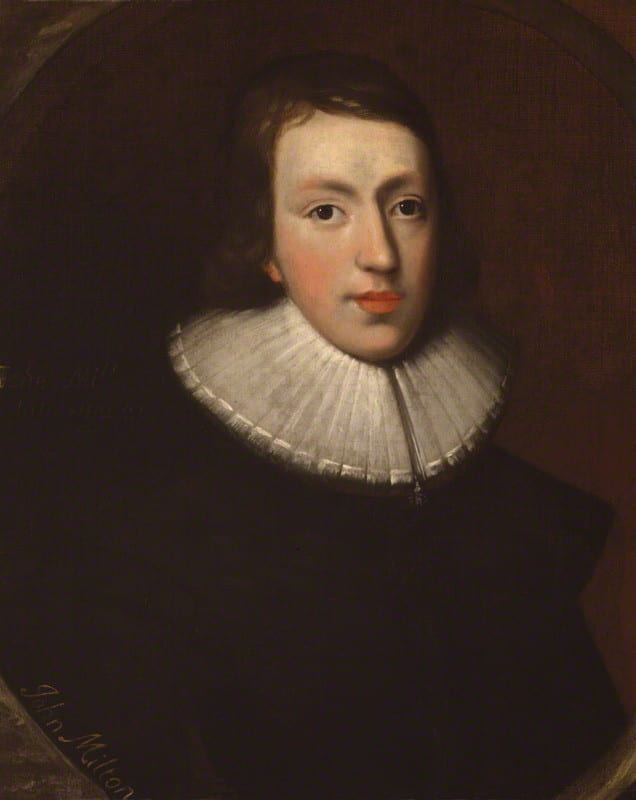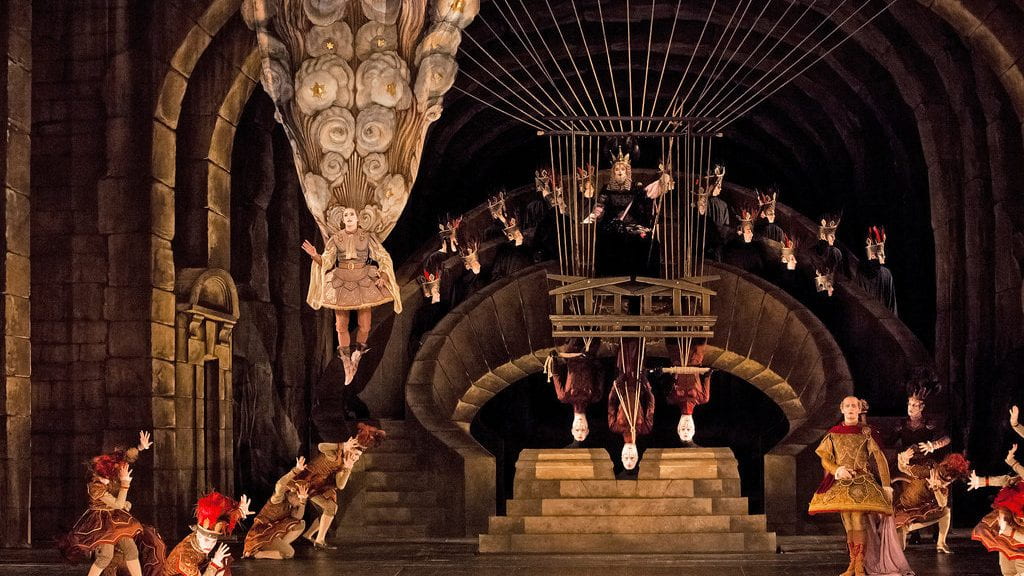By guest contributor John Phipps
February, 1639, and the festivities of the Roman carnival were approaching their apex. There had been processions and parades, public displays of civic and religious devotion—almost all bankrolled by the ruling Barberini family. The Barberini patriarch, Maffeo, sat in the Vatican as Pope Urban VIII. His nephews, Antonio and Francesco, were powerful cardinals and patrons of the arts. Together, the three men had the eternal city in their deep cassock pockets.
The crowning glory of the carnival was Virgilio Mazzocchi’s comic opera, Chi Soffre Speri (Let he who suffers, hope). It was staged in the Barberini Palace, in a theatre capable of seating several thousand. There were vast choruses, troops of dancers, and a dozen changes of scenery. Real rain and thunder would appear to threaten a stage designed by Gian Lorenzo Bernini.
Half an hour before the performance began, the young John Milton was greeted at the door by a Barberini official, and went to take his seat among the lords of Rome.

Milton was on his Italian gap year, having arrived in the summer of 1638. He was, in Susanne Woods’ phrase, ‘an oxymoron in search of the higher resolutions of paradox’: a Protestant in the home of Catholicism; a great poet who was more or less unknown to his contemporaries (ed. Di Cesare, 9). Denied entry into the priesthood, uninterested in the law, and sceptical of Caroline royal patronage, Milton was a brilliant young man with almost no prospects. So he went to Italy, in search of culture, art, and personal validation.
These were precisely what he found. Milton would write later about his time in Florence:
In that city, which I have always admired above all others because of the elegance, not just of its tongue, but also of its wit, I lingered for about two months. There I at once became the friend of many gentlemen eminent in rank and learning, whose private academies I frequented—a Florentine institution which deserves great praise not only for promoting humane studies but also for encouraging friendly discourse. Time will never destroy my recollection—ever welcome and delightful—of you, Jacopo Gaddi, Carlo Dati, Frescobaldi, Coltellini, Buonmattei, Chimentelli, Francini, and many others.
ed. Loewenstein, 347
It is a matter of record that Milton was, on his arrival in Italy, accepted as a member of a prestigious Florentine academy. On an almost weekly basis, Milton attended intellectual meetings with poets, scholars and noblemen. In Florence, the educated (and of course, male) humanist could move freely, in an elevated space where the “humane arts” superseded the old, denominational boundaries. Milton’s affectionate words—along with his long correspondence with the nobleman and poet Carlo Dati—suggest that, to Milton, Florence wasn’t far from worldly paradise.
But it’s hard not to wonder what the deeply Puritan Milton must have thought in Rome, which he would later call “the very stronghold of the Pope.” And not just in Rome, but seated in one of its finest palaces, the future author of Eikonoklastes (The image breaker) sitting down for five hours of operatic extravagance.
His feelings can only have been uneasy. He was not just a puritan and a republican, but the product of a culture that lived in fearful opposition to Rome. In Britain it was commonplace to refer to the pope as Antichrist; a Catholic zealot had tried to blow up the Houses of Parliament within living memory. At the same time, to be invited was a compliment. Milton would have been weighing his acceptance into Roman society against his feelings about the papacy; his uncertainty about princely patronage against his republicanism; his scepticism about Catholic musical propaganda against his cultural and lyric appetite.
All that, before the curtain had even risen.
And after it had? Opera would not have been, to Milton, what it is to us now. In Italy it was the exciting new art form. Public demand was exploding: in the year of Milton’s visit, two new public opera houses were built in Venice alone. What’s more, Milton’s Florentine companions believed that opera had been invented by their forebears, in an academy much like their own, and they surely would have impressed this fact upon their English guest.
In an age when Italian cities still functioned like states, regional pride was fierce, and the Florentines took pains to codify their claim to opera’s invention. Milton’s great friend Dati later wrote that opera had its roots in sixteenth-century nobleman Jacopo Corsi’s Camerata, which was “always open, like a public academy, to everyone who had intelligence or talent in the liberal arts … Recitative style for use on stage was born there (ed. Price, 135).”
“Recitative style” refers to dramatic singing over homophonic chords (as opposed to the more common polyphony), just as in modern operatic recitative. It was at once an innovation and an archaism. Its invention stemmed from the contemporary belief that ancient Greek tragedy was not spoken, but sung, and both Florentine recitative and opera were born out of the desire to recreate the mythical impact of classical tragedy. Not only were many of the early operas on classical themes, they also centred and emphasized the self-consciously Greek device of the chorus.
Milton was paying attention. At some point in the next few years, most likely not long after he returned to Italy, Milton began drafting tragedies on religious themes. These are clearly conceived with performance in mind: one contains specific instructions for costumes; others talk freely about “the audience.” Two of these drafts, for a tragedy called “Adam Unparadiz’d” or “Paradise Lost,” make extensive use of a chorus, a device unseen on the English stage for many years. One contains the shorthand instruction, “Chorus of angels sing a hymme of the creation.”
“Paradise Lost: The Opera?” It feels too unlikely to be true. But Milton was no stranger to music. His father was a composer; he himself was a good singer and talented multi-instrumentalist. He took a chest of the new Italian music home from Venice. And the 1634 masque Comus, his longest work to date, was set to music by his friend, the composer Henry Lawes. Even as a protestant amongst the world’s leading heretics, it seems that Milton was taking notes for his own dramatic designs.

Whatever his plans were, Milton’s tumultuous life got in the way. His triumph would be to write what some consider the greatest poem in English. But what awaited him beyond the page—blindness, divorce, Europe-wide infamy—cannot have been what he had hoped for from life.
The ambivalences of his Italian trip never left him. In Paradise Lost, there are several ambiguous references to the Italian humanist culture he experienced, most notably in Milton’s descriptions of Hell. For instance, an image in Book II sounds very like an Italian academy:
Others apart sat on a hill retir’d,
II. 557-561
In thoughts more elevate, and reason’d high,
Of Providence, Foreknowledge, Will, and Fate,
Fixt Fate, free will, foreknowledge absolute,
And found no end, in wandring mazes lost.
The “others” in question are the fallen angels, banished to hell by God for an eternity of torment. Yet the demons seem more like philosophers than hellhounds.
It’s not just that the fallen angels seem to be like Catholic humanists, civilized but confused, it’s also that Hell sometimes seems awfully like Italy—and in Paradise Lost Milton’s Italian references are consistently Hell-bound. Milton’s description of the devils as they lie chained on the burning lake in Book I goes so far as to be geographically specific, talking of “Angel forms:”
who lay intrans’t
I. 301-4
Thick as Autumnal Leaves that strow the Brooks
In Vallombrosa, where th’ Etrurian shades
High overarch’t imbowr.
The reference is puzzling, because it is unlikely that Milton visited this remote area during his time in Italy. Some have suggested a reference to Psalm 23; the place name translates to “The valley of the shadow.” Others see a reference to Virgil’s description of the dead in Book 6 of the Aeneid, whose souls flutter and fall like leaves in Autumn wind. But the deliberate Italianisation of the classical image, the biblical reference, the Hellish context and the elegiac tone add up to something rich, strange and ambivalent—much like Milton’s own experience in Catholic Italy..
*
The questions facing Milton in Italy have not gone away. With whom can we acceptably associate? And do we make those decisions for reasons of principle, or for fear of our contemporaries’ judgement? How can we live among people with worldviews that would exclude our own? And if we find we can live among them, what does that say about us?
The problems of liberalism have never been remote or intellectual. They are the problems of our daily life. Everyone works towards their own answer, though this is not to say that all answers are equally good. But the emotionally indeterminate Italian moments in Paradise Lost demand a change in perspective. If travel provides us with new choices, then art and literature offer us a space where we need not necessarily choose at all: where our many selves can coexist more happily than they can in daily life.
In Italy Milton was engaged in the messy business of living with difference. He was hungry for knowledge, for culture, for something new and challenging. He was lucky enough to find a world removed not only from the one he knew, but from the increasingly bitter and hostile one he would return to. Several centuries later, on a continent far away from Milton’s, Elizabeth Bishop found herself pondering the narrow possibilities of a wide world, in her poem “Questions of Travel“
Is it lack of imagination that makes us come
to imagined places, not just stay at home?
Or could Pascal have been not entirely right
about just sitting quietly in one’s room?
Continent, city, country, society:
the choice is never wide and never free.
And here, or there . . . No. Should we have stayed at home,
wherever that may be?
John Phipps is a writer. He lives in London.




Leave a Reply